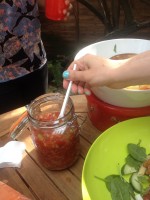TEENAGERS AND PRESERVES AND ENTREPRENEURS
A variation on the selling lemonade and the USA right of passage
Just a little motivation ?
It seems that once they have reached their teenage years and feel safe using a hob and oven, some teenagers may need just a little motivation to start cooking. Making preserves offers lots of scope .
For a start, cooking to impress their friends may include knocking up a Tomato relish for adding to a burger at a barbeque or producing an unusual combination of fruits such as a Banana and lemon jam in a jam packed sandwich.


Profiting from cooking preserves may have an altogether greater appeal.
Selling lemonade on the side of the road has been a rite of passage for the young in the USA but it has never really taken off in the same way in other countries. Certainly not in the UK. Is there an inherent disliking of encouraging commercialism or entrepreneurship in the young this side of the pond? Or are there concerns about the legality of food sales.
What about preserves, jams and chutneys? Is there anything to stop a youngster who has identified a glut of fruits in the back garden or a local stall selling the raw products from knocking them into some delicious homemade preserves and setting up a stall on the side of the road or selling door to door.
It seems not.
It appears that the Food Standards Agency (FSA) in the UK stated that charity and community events and, where foods are only occasionally prepared, are exempt from EU laws, and do not require the registering and obtaining food hygiene certificates.
According to the Senior Environmental Health Officer at my local council, a one-off situation would not fall under any council requirements. If it is more than a one off or it turns into a plan for a business, then registration with a local authority and inspection of premises is required.
Wow common sense prevails.
(It would be important to ensure compliance with local or state laws in other countries)
The officer at the Local Authority was also very keen to mention, however, that TWO important aspects of selling food should be carefully considered and they are the hygienic preparation of ingredients, sterilising jars and equipment and secondly attention to food allergens.
FOOD HYGIENE and STERILISATION of EQUIPMENT
It is essential to ensure that all fruit and vegetables are effectively washed before preparation.
Sterilising jars for storing preserves is essential for avoiding bacteria, fungi and yeast contamination but very simple.
ALLERGEN LABELLING
The FSA has set out the major food allergens as celery, cereals containing gluten, crustaceans, eggs, fish, lupin, milk, molluscs, mustard, nuts, peanuts, sesame seeds, soya, sulphur dioxide and sulphites.
Simple listing of all ingredients is an easy job to do and will satisfy the buyers.
Finally, in addition to a supportive adult at hand in the kitchen during preparation and cooking preserves for selling, a parent might also consider making themselves available on a consultation basis. This might cover a discussion of the best recipes to use, planning and publicity and pricing, and consideration of sales chat and communication on the side of the road.
Good luck entrepreneurs!
Pippa







No comments
Trackbacks
By submitting a comment you grant Let's Preserve It a perpetual license to reproduce your words and name/web site in attribution. Inappropriate and irrelevant comments will be removed at an admin’s discretion. Your email is used for verification purposes only, it will never be shared.